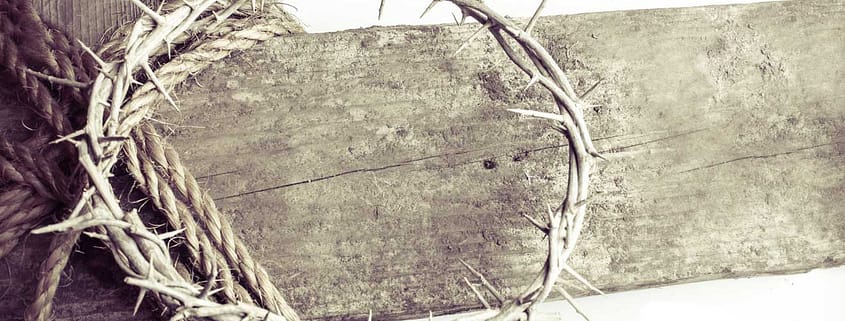God of Love, Pt. 3
What Is the Good News of Yeshua? (Part 22)
When the day for the annual Passover feast had arrived, Yeshua knew that His time was near (Matthew 26:18). Desiring to share His final Passover with His closest disciples, He sent them on ahead to prepare the foretelling meal.
That evening, as they remembered the ancient enslavement of their people and the mighty hand of God’s historic salvation, Yeshua took the unleavened bread, broke it, and distributed it among His disciples. Recalling the sudden slaughter of those first Passover sacrifices 1500 years earlier, He said of the broken, symbolic bread, “This is My body that is being given for you; do this to the remembrance of Me” (Luke 22:19). And in recognition of the lambs’ innocent blood—the blood that had been applied to the doorposts of Israel’s homes; the blood that had set God’s people free from Egyptian slavery and death—He took the fruit of the vine and gave it to them, saying, “This cup is the [new covenant] in My blood that is being poured out for you… for release from sins” (Luke 22:20, Matthew 26:28).
By the sinless, battered body and guiltless blood of “the Lamb of God, who is taking away the sin of the world” (John 1:29), Yeshua would soon complete the story of Israel’s exodus. The doorposts of their hearts could now be painted, and the houses of their bodies passed over by Death. Just as God had sent a deliverer to save Israel from slavery in Egypt, now the Jewish people were about to receive eternal deliverance from their enslavement to sin, and be brought by a mighty hand and an outstretched arm into the everlasting promised Land.
Through the Messiah’s Passover sacrifice, not only would the God of Faithfulness keep His covenants with Israel, but the God of Love—fulfilling the word of the prophet—would make with them a new one.
“Look! days are coming”—an utterance of Adonai—
“That I will have made with the house of [Israel]
And with the house of [Judah] a [new covenant],
Not like the [covenant] I made with their fathers
(In the day of My taking their hand
To bring them out of the land of [Egypt]),
In that they broke My [covenant],
Though I ruled over them….
For this is the [covenant] that I will make
With the house of [Israel] after those days:
…I will have put My Torah in their inward part,
And I will write it on their heart,
And I will have been to them for their God,
And they will be to Me for My people….
For I will forgive their guilt,
And of their sin I will make remembrance no more.”
(Jeremiah 31:31-34, mjlt)
God’s New Covenant with Israel—established in Yeshua’s body, ratified by His blood—would restore His covenantal relationship with His people. Because they had forsaken the Torah and broken the covenant of their fathers, Yeshua was sent to be the “mediator of a better [covenant]… sanctioned by Torah on better promises” (Hebrews 8:6). Through Yeshua, the reconciliation between God and man would no longer depend on a temporary atonement from the blood of goats or bulls. Rather, by the Messiah’s very own blood, mankind would soon find the permanent path to the forgiveness of their guilt—and the way would be made for God to forget all of our sins forever.
After the meal and into the night, Yeshua retreated with His disciples to pray in a secluded place outside of Jerusalem. Heavy-hearted and exceedingly sorrowful in His soul, He cried out to the Father, seeking God’s divine intervention and will (Matthew 26:37ff). As He rose from His prayers and woke His sleeping disciples, He found a swiftly approaching armed mob which had been assembled by Israel’s hardened conspirators. And with the enlistment of a traitor and the muscle of the Roman government, the Jewish authorities secured Yeshua’s arrest, His disciples scattered, and His appointed fate was sealed (Mark 14:43ff, John 18:3).
Did this post bless you?
♥
In covetous fear, the high priest and the entire Jewish council sought the death penalty for their Savior (Mark 14:55). To justify such a sentence, they proceeded to conduct a sham trial complete with a parade of false, unreliable witnesses. Yet, despite their best efforts, they were easily frustrated, being unable to corroborate the conflicting testimony (14:56). Finally, in utter exasperation, the high priest rose up among them and, questioning Yeshua directly, asked Him, “Are you the Messiah—the Son of the Blessed One?” (14:61). And Yeshua—admitting the truth, claiming to be the Son of God, and thereby assuring His own conviction—confessed to His singular, undeniable offense: “I am” (14:62). That was all they needed to hear; there was no need for further witnesses. The high priest tore his clothes and pronounced the crime of blasphemy, and they each declared Yeshua “worthy of death” (14:64). The ones holding Him spat in His face; they blindfolded Him, they slapped Him, and they beat Him. And by morning, the matter was settled…
The leadership of Israel was ready to hand over their one, true Messiah to be crucified.
What do you think? Share your thoughts in the comments below!







Leave a Reply
Want to join the discussion?Feel free to contribute!